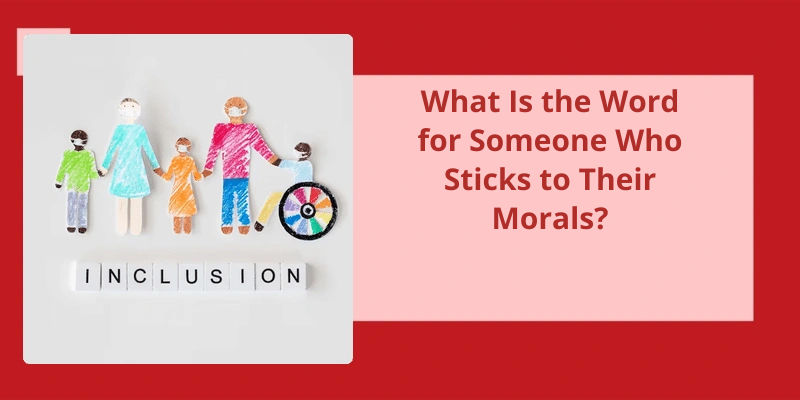Within this, individuals who exhibit a steadfast adherence to moral principles and values are often seen as exceptionally upstanding individuals. Such individuals are known to be upright, honest, just, conscientious, scrupulous, and honorable, each term expressing the strict regard they hold for what’s morally right. The unwavering commitment to living a life of integrity and honor is the hallmark of those who embody such principles, serving as a source of inspiration to those around them. While these individuals may face challenges and dilemmas in their daily lives, their unwavering resolve to abide by their moral compass continues to be a source of strength and resilience, a testament to their character and virtue.
What Is a Person Who Has Morals?
A person who’s morals is an individual who adheres to a set of ethical principles and values. This individual recognizes the distinction between what’s considered right and wrong, and strives to act in accordance with these beliefs. A moral person is guided by a sense of responsibility towards others, and is committed to making decisions that reflect their personal convictions.
The moral convictions of an individual are shaped by a variety of social and cultural factors. These may include religious beliefs, family values, and the norms and expectations of their community. A moral person may also draw on their own personal experiences and sense of empathy to guide their behavior.
Morality is often seen as a foundational component of human civilization. The existence of shared moral principles allows for cooperation and social cohesion, and promotes a sense of trust and mutual respect among individuals. A society that values morals and ethical behavior is more likely to function in a peaceful and harmonious manner.
Despite the importance of morality, it can be difficult for individuals to reconcile their own beliefs with those of others. Differences in culture, religion, and personal experience can all impact an individuals moral perspective. As such, it’s important for moral individuals to approach disagreements with an open mind, and to engage in respectful discourse with those who hold opposing views.
Their behavior is guided by a sense of responsibility towards others, and their beliefs are shaped by a variety of social and cultural factors. While morality can be a source of disagreement and conflict, it’s importance in promoting cooperation and social cohesion can’t be overstated.
The Evolution of Moral Beliefs Throughout History and Across Cultures.
- The ancient Egyptians believed in a complex system of ethical principles centered around Ma’at, the concept of truth, balance, and order in the universe.
- In ancient Greece, philosophers such as Socrates and Aristotle debated the nature of morality and it’s relationship to reason and virtue.
- The Ten Commandments, given to Moses by God according to the Bible, outline the basic moral principles of Judaism and Christianity.
- The teachings of Confucius in ancient China emphasized the importance of personal and social responsibility, respect for elders, and harmony in relationships.
- Buddhism, originating in India and spreading throughout Asia, emphasizes non-violence, compassion, and the pursuit of enlightenment through ethical behavior and mindfulness.
- The concept of karma, a fundamental principle in Hinduism, Jainism, and Buddhism, involves the idea that actions have consequences and that ethical behavior can lead to positive outcomes in future lives.
- The Enlightenment in Europe during the 18th century emphasized reason, individualism, and the pursuit of happiness as fundamental moral principles, leading to the development of modern liberal democracies.
- In contemporary times, debates over moral issues such as abortion, same-sex marriage, and capital punishment continue to be the subject of discussion and controversy in various cultures and societies around the world.
When we talk about someone being virtuous, it isn’t just about their actions, but also about their underlying values and principles that guide their behavior. It speaks to their integrity, honesty, and self-discipline, as well as their willingness to act in the best interest of others. In essence, calling someone virtuous is a way of acknowledging their strong moral character and their commitment to doing what’s right.
What Do You Call a Person With Good Morals?
A person with good morals is often described as a virtuous individual. This is because they live their lives according to a set of high ethical standards that guide their behavior. These individuals prioritize the welfare of others above their own desires and act in ways that align with principles of fairness, honesty, and integrity. Simply put, a virtuous person is someone who consistently does what’s right, even when it isn’t easy or popular.
There are many traits that define a virtuous individual, including empathy, compassion, and selflessness. These individuals show genuine concern for the well-being of others and are often willing to go out of their way to help those in need. Additionally, they’re honest and transparent with their intentions and actions, and don’t seek to deceive or manipulate others for their own gain. Their strong sense of integrity ensures that they remain true to their values, even in the face of temptation or adversity.
In many cultures, the concept of virtue plays a central role in moral and ethical philosophy. These principles are often outlined in religious texts, philosophical treatises, and cultural traditions, and provide a framework for ethical decision-making. By adhering to these principles of virtue, individuals are able to live purposeful, meaningful lives that are based on a foundation of moral character.
How to Cultivate and Improve One’s Own Moral Character
- Reflect on personal values and beliefs
- Set goals for self-improvement
- Practice self-discipline and consistency
- Cultivate empathy and compassion
- Build meaningful and positive relationships
- Engage in ethical decision-making
- Continuously learn and grow
Source: Virtuous – Definition, Meaning & Synonyms – Vocabulary.com
The concept of morality has long been a subject of interest for philosophers, theologians, and psychologists alike. It’s often associated with the idea of being a good person, but what traits and behaviors define a morally upright individual? According to some schools of thought, there are eight key moral characteristics that can be used to measure one’s level of morality. These include qualities such as diligence, frugality, honesty, and generosity, each of which plays a role in shaping one’s ethical outlook and overall approach to life.
What Kind of Person Is a Moral?
A moral person is someone who holds themselves to a high standard of behavior and strives to live their life in a way that aligns with their values. In order to be considered truly moral, they must exhibit a combination of different characteristics that speak to their overall integrity and strength of character. One such characteristic is diligence, which is characterized by a strong work ethic and a commitment to seeing things through to the end. Such a person puts in a genuine effort to get things done, even when they’re challenging or unenjoyable.
Another important moral characteristic is frugality, which involves being responsible with ones finances and avoiding wastefulness. This involves being mindful of ones resources and using them wisely, whether that involves money, energy, or time. Honesty is also crucial in a moral person, as it’s a fundamental trait that underpins all other virtues. Being honest allows a person to build trust and respect with others, which in turn leads to more positive relationships and a happier life overall.
Discipline is another key characteristic of a moral person, as it requires a strong will and a willingness to hold oneself accountable. Discipline involves putting in the effort to maintain good habits and avoid bad ones, even when it’s difficult or inconvenient. Politeness and courtesy are also important moral traits, as they promote a sense of respect and consideration for others. Cleanliness is also important, as it reflects a commitment to personal hygiene and caring for ones physical environment.
Finally, generosity is a vital moral characteristic, as it involves giving freely of oneself for the benefit of others. A generous person is willing to help others when they’re in need, whether that involves donating time, money, or resources. They’re also willing to share their knowledge and expertise with others, and they don’t hesitate to support those who’re struggling.
Empathy and Compassion Towards Others
Empathy and compassion towards others is the ability to understand someone’s feelings and experiences while also feeling concern and care for that person. It’s an important aspect of building strong relationships and creating a sense of mutual understanding and support. It involves actively listening to others and striving to understand their perspectives, which in turn can strengthen empathy and compassion towards others.
Conclusion
In a world where moral standards are often compromised and integrity appears to be a thing of the past, being a person who sticks to their morals isn’t only admirable but crucial. This trait is characterized by a strict adherence to moral principles, and is often associated with qualities like integrity, honesty, fairness, and conscientiousness. Individuals who embody these values demonstrate a deep sense of responsibility towards themselves and others, and they prioritize doing the right thing over profit or convenience. Their unwavering commitment to moral principles is a reminder that there’s still hope for a just and equitable society where honesty and integrity reign supreme. Ultimately, striving to be like these individuals isn’t only a personal accomplishment, but a contribution towards creating a more ethical and fair world.





